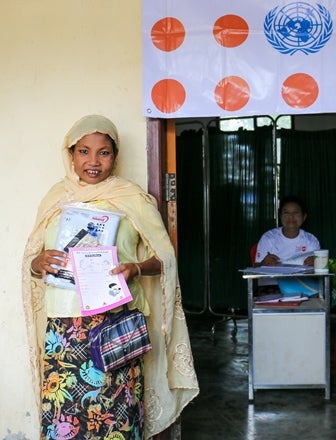RAKHINE, Myanmar - 19-year-old Phu Tu Nee went into labour as the first tropical storm of the 2018 monsoon season descended on Myanmar. She gave birth while the rain and storm pounded on the small shelter. The day after, as the sun comes out, and with her newborn baby beside her, she feels like any first-time mother anywhere in the world: She is exhausted and happy.
But Phu Tu Nee is not like any first-time mother. She is part of a minority in Myanmar who identify as Rohingya. While over 700,000 people have fled to Bangladesh, she is one of an estimated 300,000 people who remain confined to camps and villages in the central part of Myanmar’s Rakhine State. Their freedom of movement is severely restricted, and so is their access to basic services such as health care. For Phu Tu Nee, there was no midwife to call, no delivery clinic for her to go to. Instead, like all the women in the camps and adjoining villages, she had to rely on a traditional birth attendant.
A clean blade to cut the cord
When she was pregnant, Phu Tu Nee visited the weekly UNFPA mobile clinic several times for antenatal care. There she also received a clean delivery kit to bring home to the small hut she shares with her husband and 10 in-laws. The kit is essential for making births as clean and safe as possible in cramped shelters with no sanitation.
The UNFPA clean delivery kit contains a soap to allow the birth attendant to clean her hands before the delivery and before cutting the cord; a plastic sheet for the mother to lie on during the birth; sterile gloves, and a sterilized razor blade to cut the cord; clamps for the cord; cotton towels; and a plastic bag for the placenta.
The clean delivery kit saves lives by making it possible to maintain basic hygiene when women have to give birth in insanitary conditions, in shelters or in the open. In emergencies and crisis situations, many people do not have a knife – let alone a clean knife – to cut the cord. Instead they are reduced to using a piece of bamboo or a stone which can introduce deadly infections such as tetanus.
A clean sheet to wrap the baby
Phu Tu Nee kept her clean delivery kit until her labour pains started, and she asked the traditional birth attendant to use it during the delivery. She also had a clean white sheet, provided by the mobile clinic, to wrap her baby in. Now with the birth behind her, her head is swirling with questions about how to keep her baby healthy and about her own body. She has the same worries as most new mothers:
“My milk has not come in yet”, she says. “It has been 24 hours since I gave birth. Is it normal? Is my baby OK?”
The UNFPA-supported health volunteer, Phyu Phyu Thant, who has come to visit her at home, reassures her. She explains that it often takes two or three days for the milk to come, and she gives Phu Tu Nee maternal health advice:
“Take the vitamins and the iron tablets that you received from the mobile clinic. And make sure you drink plenty of water. Just keep putting the baby to your breast, and the milk will come. Remember, the baby should drink only breast milk. This is best for the baby and best for you.“
Phyu Phyu Thant admires the baby boy, who is yet to receive a name, and asks Phu Tu Nee to come for a postnatal visit when the mobile clinic returns next week. There she will receive a medical check-up by the doctor and additional vitamins from the health assistant. She will also be invited to speak with the midwife about birth spacing, and why it is important to her own health to wait at least 24 months before conceiving again.
4,200 expecting mothers received clean delivery kits

The health volunteer are recruited and trained by UNFPA and its partner the Myanmar Medical Association. They are themselves displaced, and they live in the camps and adjoining villages. Because they are part of the community they serve, they have intimate knowledge of the specific sexual and reproductive health needs and concerns of the women and adolescent girls in the camps.
“The mobile clinic can only come once a week – they have to visit so many camps. But in between clinics, because I live here, I can keep an eye on the women that I worry for. And I always do the rounds before clinic time to make sure the women come to get skilled medical care from real doctors and real midwives.”
In 2017, UNFPA distributed 4,200 clean delivery kits to expecting mothers in conflict and crisis affected areas in Myanmar, including Rakhine, Kachin and Shan. The mobile health clinics are funded by UNFPA with support from the Myanmar Humanitarian Fund, and are operated by the Myanmar Medical Association.

